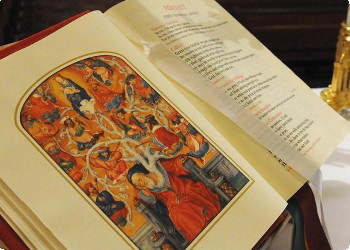He unrolled the scroll and found the passage where it was written
1Ts 4,13-18; Ps 95; Lk 4,16-30
2 SEPTEMBER
What happens in the synagogue of Nazareth is the fruit of the wisdom of the Holy Spirit that hangs over Christ Jesus. Wisdom is in the choice of the text to read and to comment. In Isaiah there are indeed many texts that are true explicit prophecy about the coming Messiah. At present it is not the time to reveal his perfect identity as Christ of God. This hour for the people will be the day of his solemn entry into Jerusalem, giving fulfilment to the prophecy of Zechariah. But, today, Jesus must attest that He comes from God. He comes as a prophet of the Lord. He comes to carry out some specific works: bringing the good news to the poor, proclaiming liberty to the prisoners and to blind the sight, setting the oppressed in freedom and proclaiming the year of grace of the Lord. These are the works of the Messiah, but also of the prophet. By examining everything well, they are all works that are done with the word. No other thing is required. No armies or soldiers, no swords, no spears, no weapons of offense and no defence is necessary. The word is sufficient. Now only the prophet acted with the Word. The kings acted with weapons, armies and a court all at their service. The prophet always acted alone. All great prophets are without people next to them. Only Elijah was accompanied by Elisha for some time. Elisha himself was a prophet without other prophets following him. He only had a servant who accompanied him along the way. Being what Jesus reads a prophetic work, no one might ever think that He is the Messiah. Everyone can think of it, but neither today nor tomorrow he might say it. Even the devils say it. But he must keep quiet about this mystery that surrounds him. History demands it.
He came to Nazareth, where he had grown up, and went according to his custom into the synagogue on the Sabbath day. He stood up to read and was handed a scroll of the prophet Isaiah. He unrolled the scroll and found the passage where it was written: “The Spirit of the Lord is upon me, because he has anointed me to bring glad tidings to the poor. He has sent me to proclaim liberty to captives and recovery of sight to the blind, to let the oppressed go free, and to proclaim a year acceptable to the Lord.” Rolling up the scroll, he handed it back to the attendant and sat down, and the eyes of all in the synagogue looked intently at him. He said to them, “Today this scripture passage is fulfilled in your hearing.” And all spoke highly of him and were amazed at the gracious words that came from his mouth. They also asked, “Isn’t this the son of Joseph?” He said to them, “Surely you will quote me this proverb, ‘Physician, cure yourself,’ and say, ‘Do here in your native place the things that we heard were done in Capernaum.'” And he said, “Amen, I say to you, no prophet is accepted in his own native place. Indeed, I tell you, there were many widows in Israel in the days of Elijah when the sky was closed for three and a half years and a severe famine spread over the entire land. It was to none of these that Elijah was sent, but only to a widow in Zarephath in the land of Sidon. Again, there were many lepers in Israel during the time of Elisha the prophet; yet not one of them was cleansed, but only Naaman the Syrian.” When the people in the synagogue heard this, they were all filled with fury. They rose up, drove him out of the town, and led him to the brow of the hill on which their town had been built, to hurl him down headlong. But he passed through the midst of them and went away.
The wisdom of Jesus also manifests itself in the conduction of the dialogue with those present in the synagogue. Quoting Elijah and Elisha, he leads the people to see him for the moment only as a prophet. If he is a true prophet he is not obliged to perform any work. The works of the prophets are the Word of God proclaimed by them and which is accomplished at due time. Sometimes even centuries can pass. The fulfilment reveals that they were true prophets. They spoke in the name of God. Jesus does not ask that they immediately believe in his Word. he prepares hearts to believe when his Word will be fulfilled. This is also divine wisdom. But those of Nazareth today let themselves be governed by folly and even come to want to kill Jesus throwing him from the cliff. But he gives a great sign of his being a man of God. He divides the crowd in two, just as Moses divided the Red Sea, passes among them and goes away. From the Gospel we know that not long afterwards Jesus returns to Nazareth and this time he was welcomed with joy. The seed of the Word had been thrown into the hearts. Something had started to sprout. When the man of God speaks with great wisdom of the Holy Spirit, the Lord will do the rest.
Mother of God, Angels and Saints, fill us with the wisdom of the Holy Spirit today and always.





